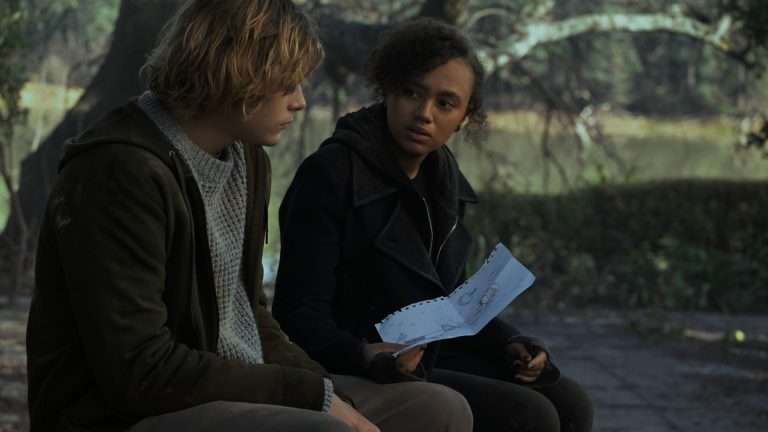Quite early on, Aparna Sen, in her latest directorial, The Rapist, plants the viewer right in the site, which will drive the engine of her thematic inquiry, that is, the slums on the outskirts of Noida. The protagonist, Naina, a Delhi University, criminal psychology professor, is also engaged in activism and fieldwork, leading her to investigate and analyze cases firsthand with her friend and colleague, Malini. When the university janitor’s acquaintance is found having killed off her daughter, having long endured her in-laws’ invectives for birthing a girl, she is labeled a witch and stands the threat of expulsion from her place in the slum. Naina takes a proactive interest in this situation. She negotiates with the cops looking into the matter and is just about to retreat to the privilege of her upper class ‘left liberal’ echo chamber and life, when all the boundaries between a researcher’s curiosity in a subject and direct, personal consequence are thoroughly shattered, irrevocably altering and striking at the very roots of how she views her practice. This fraught interaction between a very subject and an inalienable consciousness that disrupts Naina’s trajectory and viewpoint foregrounds much of The Rapist.
Naina’s rape at the hands of slum boys, who are of the same age as her students, which the film even spells out, digs out to her complex, unnerving questions about not just power, but the factoring in of privilege, socioeconomic location, the miasma of being hemmed in by masculinist impulses to the degree of being coerced into its socialization as well; and how much of normalized vocabularies of violence and abuse that one perceives and experiences can damagingly build skewed notions of fundamental human concerns.
Checkout – 10 Essential Bengali Films Of The Last Decade (2010s)
Sen is interested in excavating and slicing through this damage that can enable the envisaging of such a heinous act that can shake the collective conscience of society, also something that the film takes pains to state explicitly. To grapple with the rape in all its many-sided trauma and reverberating implications on the whole of her everyday life, Naina is compelled to locate and establish some ground, a communicative, introspective channel, with the source of an imagination that recognizes such acts as necessary lesson and punishment to women who interrogate it. Naina and her husband, Aftaab, are pushed into brutal self reckonings, re-assessment, and a rattling of their stable outlooks towards the death penalty. Naina’s interviews with death row prisoners are eagerly sought after by her students; she’s a member of the anti-capital punishment forum. Aftaab subscribes to this as well.
As Sen stresses too frequently, the couple is part of an exclusive Delhi left-liberal coterie, whose sincerity of intention and action is cast into murky doubt by the chain of events, with Naina being pregnant with the child of her rapist serving as the propeller of inward, psychological questioning. The asperity of the film’s tone is undercut by the misplaced business of the plot and the hurrying nature of the depicted set of circumstances and episodes. The mechanics of the film’s inner workings are instantly identified and named through Naina’s classes at the university, as she talks about Lombroso’s The Criminal Man.
Naina and Aftaab occupy the elite echelons of Delhi. Aftaab sponsored the education of their house help’s son, Kabir. They like to think they are generous, considerate, and open-minded in their perspectives toward the disadvantaged. Kabir only serves to buttress the comfort with which they have shielded their positions in society, thereby regarding themselves as morally and socio-politically irreproachable.
The unsettling of this conscience, which the film drives home as ‘left liberal’ with the subtlety of a sledgehammer, figures significantly in the movie, and so do the convenient configurations of one’s socio-political stance when a crisis hits close to the bone. The rupturing of whatever they held and regarded as their principles and worldview become the source of dramatic tension in The Rapist.
‘The Rapist’ progresses linearly. Divided into chapters titled ‘the backdrop,” the incident,’ ‘aftermath,’ ‘justice,’ the treatment and execution of such an inherently thorny narrative terrain skates precariously close to being overtly neat and simple-minded, despite frequent conspicuous and unsuccessful attempts to imbue or instead pile on the thoughts of the character with endless dilemmas, vis a vis their course of action.
The laying of the film’s designs can be made instantly, the connections Sen strains to create and have us reflect on us heavy-handedly, in a distinct schoolteacher’s hectoring tone. The scenes skitter past without any sense of rhythm or an ability to calm down and allow the viewer to think along with; instead, the attitude it takes on is to talk down, expound, over-explain, and overstate things in a manner that also strips the film of any emotional force that it should have gathered by the time it winds up to Hariharan’s haunting Hindi rendition of ‘Gobhiro rajani’.
Related to The Rapist – 15 Best Konkona Sen Sharma Movie Performances
Sen hops from one chapter to the next so impetuously that it deprives us, the viewer, of well earned time to acknowledge and process the relentless post-rape trauma that Naina undergoes as Naina herself forages to make sense of and wrestle with her overwhelming psychological and physical distress and ruthless splintering of herself. Rabiranjan Maitra’s editing enables the frantic pace with which everything in the film jumps ahead; the trauma section especially and Naina’s gradual recuperation feels severely curtailed, and therefore Naina’s gathering herself up and steeling herself from the effects of the rape and the noise of public opinion after it, which endanger the circumscribing of her identity into an object of sympathy and victimhood to be sorry about, is only half-realized. We watch her being bulldozed on various levels after the incident.
The police procedure that pays no heed to her physical health or medical needs or her repeated inquiries about Malini, with its barrage of questions that call her a hooker for being out so late at night on such a desolate road, the court proceedings that demand her to rationalize how her undergarment hadn’t ripped off if she did resist as she claims, being asked “were you raped from front or rear?”- the humiliation and abasement regularly shoved on Naina is charted out straightforwardly. Everyone sidesteps the insistent urgency of what she wants to know and be reassured by. The police deride and ask the bus conductor who reported the bodies of Naina and Malini on the roadside if he was trying to be a hero. The cops could have just gone home had the person not reported, expunging duty’s late-night hassle.
Either there is no sensitivity or the modicum of empathetic patience Naina receives from the authorities tasked with the nitty-gritty of her rape, or there is a mantle of victimhood that she battles with but can’t jettison, as interactions with everyone around her foist the reminder of the incident on her in the supposedly inadvertent ways and means. Naina is offered a sabbatical from teaching by her university; she tries to take a class, but the perceived gaze towards her that marks her out as a rape victim numbs her out. Women collective groups request her to write about the post-rape daily experience in the hope it might aid other rape survivors in coming to terms with the incident.
Sen’s hold over her film starts stumbling increasingly as the film delves deeper into the underlying toxicity in the panoply of causes and history that bred someone like the Rapist, Prasad Singh, which is ostensibly what the film centrally is all about, emphasized titularly. The film aims at being a psychologically dense exploration of the perpetrator, the survivor, and those surrounding both. It boldly undertakes a herculean aspiration to light a flame and sharpens out into clear view all the fault lines across the two worlds of privilege and its lack thereof that the film traverses, to mostly stilted effect.
The film attempts a dialogue between these two disparate worlds, even interjecting counter voices often in the mix and trying to disturb fixed standpoints within one world. Prasad was shorn of a healthy ecosystem of love and dignity, compassion and tenderness right from his childhood, razed into compliance with patriarchal indoctrination. Aftaab counters by saying that a rotten childhood and a poor background can justify such acts of violence. What about those incidents among affluent families? Prasad’s opinions about his mother are vitiated by his firm conviction in women are the ones who must be controlled, chastised, and burdened with rank ignominy should they be raped or abused by men. Sen also infuses the screenplay with tangents about marital rape, the threat of communal erasure, and being left with no choice but to live with the agent of violence to keep off social disgrace. However, these feel like afterthoughts that the film cruises by so does the wholly unnecessary angle involving Aftaab’s lawyer friend.
Naina’s desire to have her biological child is problematized by the midpoint revelation in the film, crucially engendering the troubling of the couple’s belief patterns. Sen gets caught up and ultimately trapped within the associative conundrums sprung by the left-liberal mindset, which is dissected primarily through the conversations between Aftaab and his closest friend, Subhash.
The film’s stylistic flourishes that are manifested through the device of Naina’s nightmares might have sounded fascinating on paper, but the execution comes off as spectacularly sloppy, as an exchange between the living and dead, as grievances are shared, and indictments are levied. The idea of taking back power from one’s assailant is floated through these hallucinatory stretches. Otherwise, the film itself is much uninspired structurally and barely makes it past the surface of the intertwined anxieties that it seems to pursue.
Related to The Rapist – Guilty Minds (Season 1): Review, Recap & Ending Explained
Hussain Haidry’s dialogues are synthetic and encapsulate an overwritten script’s worst excesses. Ayananka Bose’s shot-taking is dull and too literal in several scenes, notably those where Naina charges at Prasad, overselling the point about her being in the position of power above him, and a few lazy, unimaginative ones between the house help, Savitri, and the couple.
Unsurprisingly, what manages to bolster the film together is Konkona Sensharma’s astonishing performance, a volatile stew of emotional uncertainties, constantly alternating between the expected behavioral responses and her growing need for closure that can be affected through the most challenging conduits.
As Naina, she is bruised, anguished, exasperated, searching for a reliable, stable understanding of what she is experiencing and desperately hoping Aftaab can let her process things at her own pace without being assaulted by judgment and censoriousness. Her anger at being faced with a tumult of emotions running into each other is ferocious. After the rape, Naina teeters on edge, wretchedly grasping for coherence and breath and struggling to rearrange her life and emotional responses into some acceptable supposed normalcy. However, she is bothered by an onslaught of a tussle within to fully realize that state of functionality, making her tailspin off into a feral restiveness.
Watch her, especially in the scene where she tells Arjun Rampal’s Aftaab that she is disgusted every time she goes to meet her rapist, but she needs and has to understand him; Konkona masterfully inflects her voice, going from sheer woe to a sliver of hope that might be arrived at and accumulated through her encounters with Prasad. However, the pitch of many scenes is intrinsically so loud and broad and on the nose, exacerbated by the poor writing, that even Konkona occasionally comes off as shrill, but she has such a fine sense of economy and excess that she reins herself in quickly enough.
Despite ‘The Rapist’ carrying a painstakingly underlined vigor relating to capitalizing every note in its telling, I was strangely left cold, my takeaway being Konkona’s supreme gifts impeded by a film that becomes limp in being so overwritten and is skeptical of her emotional intelligence. Tanmay Dhanania has a practical, brooding air about him, but the script does not let its characters operate without the binding confines of a long chain of causality and its ability to reorient thought systems. Feelings turn into visible puppets in Sen’s ideological project that, in its condescending easy comprehensibility, are shunted by a lack of nuance and an etched-out arc about their inner lives.
The Rapist screened at the 27th Kolkata International Film Festival 2022
Trailer
The Rapist Links: IMDb
Director: Aparna Sen
Cast: Konkona Sen Sharma, Arjun Rampal, Tanmay Dhanania, Sukhesh Arora, Monica Dogra, Anindita Bose





![Sundarbaner Vidyasagar [2022] Review – Interesting premise and plot makes this show a different one from the usual thriller oeuvre](https://79468c92.delivery.rocketcdn.me/wp-content/uploads/2022/03/Sundarbaner-Vidyasagar-768x427.jpg)
![The Fame Game [2022] ‘Netflix’ Review: Madhuri Dixit Navigates Stardom & Family Issues in This Crime Thriller](https://79468c92.delivery.rocketcdn.me/wp-content/uploads/2022/02/The-Fame-Game-2022-768x432.jpg)


![The Northman [2022] Review – A Simple Tale of Revenge with a Grand Vision by Robert Eggers](https://79468c92.delivery.rocketcdn.me/wp-content/uploads/2022/04/The-Northman-Movie-Review-1-768x512.webp)